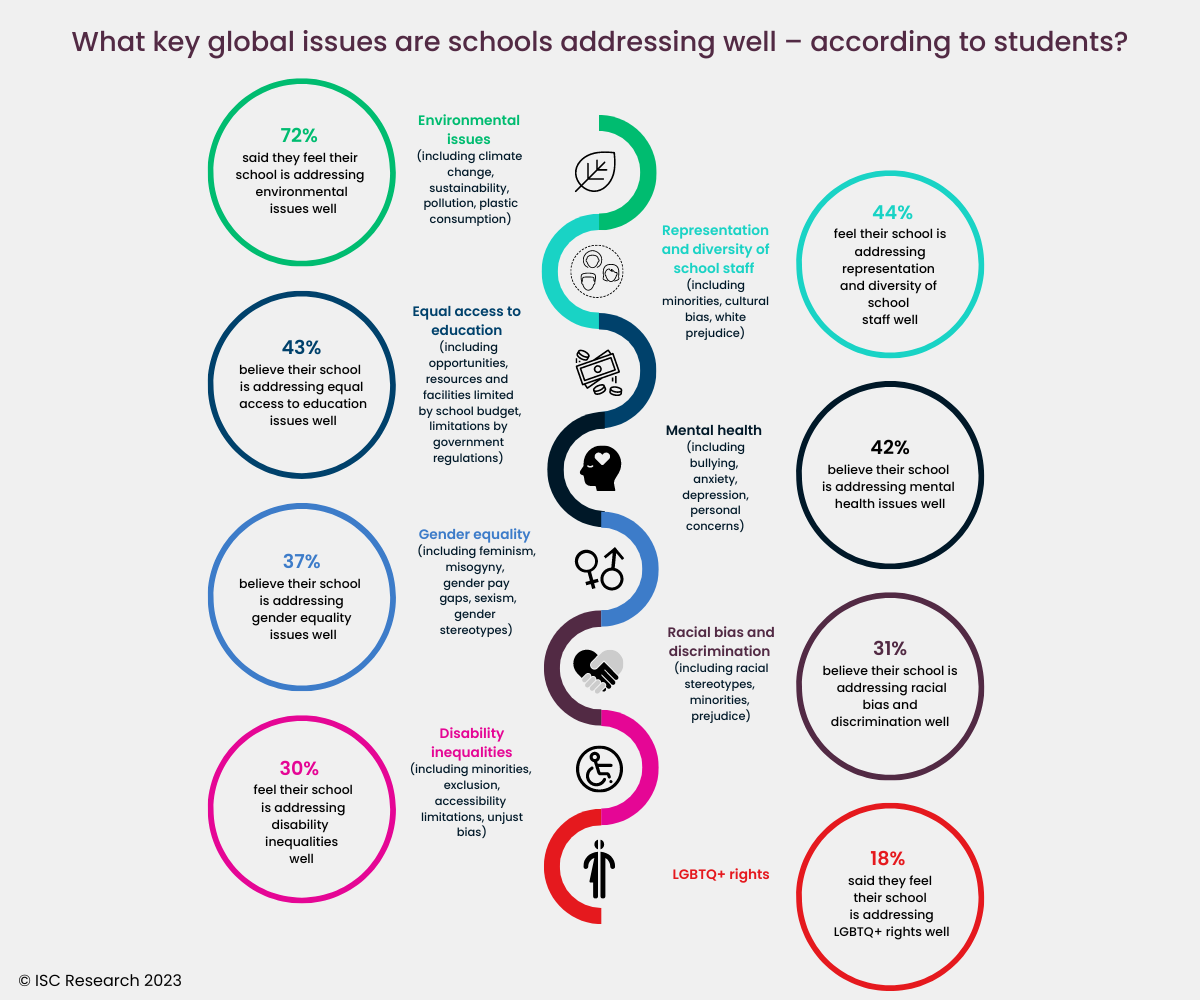Research conducted into student voice by ISC Research shows that many English-medium international schools are working towards elevating student voice, although most schools are in the early stages of a journey towards change. We invited two international school consultants to join our latest webinar and discuss the results of the research. What practical solutions are there to help international schools open up about student voice? Our panellists, Joel Jr Llaban and Matthew Savage, shared some advice and insights on the research findings.
Courageous conversations drive change in schools
We carried out two separate surveys as part of this research: one with students and alumni, and another with educators and administrators. The student voice survey results show a high level of awareness of a range of social justice issues, with environmental justice taking prominence. However, for Joel Jr Llaban, Director of Diversity, Equity, Inclusion and Justice at the International Schools Service (ISS), the low interest on racial justice, race and racism was surprising.
“Race and racism surfaced in different anecdotal responses within the data; some were direct statements, whereas some are an allusion, a connection, or a reference to it. This makes me wonder if this is a reflection of the minimal conversations we have in schools around race and racism, or the courageous conversations we still have to boldly and deeply pursue, as well as the lack or limited racial literacy development at schools.”
Our second panellist, Matthew Savage, Independent Consultant and a former International School Principal, agreed that these common topics are really important, but thought that “perhaps [they] are some of the easier things to wrestle with.” From the educator and administrator survey, Matthew highlighted that curriculum, recruitment, policy and strategy, and DEIJ were not tackled by schools as much as other topics. “I wonder whether sometimes those things are more difficult to engage student voices on,” he said, “but that doesn’t make them any less important.”
How can schools effectively address student voice?
To embark on this journey of change, a first recommended step is to speak to students. Joel invoked Dr Dena Simmons’ words, “until we ask them what they need, we cannot give them what they need.”
Both Matthew and Joel emphasised how getting the culture and system right within a school is crucial to making effective change. Matthew talked about an “unintended condescension [that exists] within many student voice structures and systems in schools across the world.” As a result, “student voice requires a systemic approach and needs to be deeply embedded in the pedagogy of the classroom,” said Joel. To do so, Joel explained how schools need to be intentional in creating a listening culture for students, but also for adults, reminding us of the words and work of Paul Gorski to “fix injustice, not kids”. “We need to think about what is within our system that we can establish and create for people’s voices to be honoured, valid and intentionally invited into the community,” said Joel.

Underrepresentation of the margins
In the webinar, Matthew discussed underrepresentation of the margins as a common mistake schools make on the journey to amplifying student voice. “If our student voice structures and groups are centred around those already at the centre, then that’s a key challenge.”
Joel agreed, touching upon the idea of “mapping others at the margins”. “They [school leaders] need to actively seek out those perspectives that have historically been ignored or dismissed… I always go back to the idea of listening to the silence, listening to the silent and listening to the silenced. Those three things will tell us different stories. Often, we tend to listen more to people who can articulate the story, however sometimes the stories of harm, hope and healing come from those stories that are sometimes untold until we really expand, explore and excavate them.”
To ensure those margins are heard, Matthew shared some practical advice that may be helpful to many schools and school leaders around the world. “We need to ensure our student leaders and our student voices are trained – and that means all of our students – as to how most effectively to have a voice and to have that voice heard.”
Arbiters of student voice
Understanding our power, as adults, and choosing how to use it is prerequisite to making effective change, according to Joel and Matthew. “Student voice can challenge the status quo and our adult perspective: the power. It’s about understanding and unpacking the power we have as adults and how it can harm a yield, how it can silence, how it can sustain, how it is a barrier, and how it is an enabler… it means being willing to challenge the existing power structures and how we think about education,” said Joel.
Matthew shared how there is further to tread on the journey to making effective change within schools and amplifying student voice. “I wonder whether too much we, as adults, are the gatekeepers and the arbiters of student voice which renders that voice, not necessarily the students… we either choose as leaders to retain power, or we choose as leaders to relinquish power,” he said, encouraging us to “embrace uncomfortable questions!”
This research project was a very important first step towards encouraging student voice and learner agency, but the conversation doesn’t stop here! Learner agency will be discussed in depth on 6 June at our virtual Edruptors conference. You can find out more about the agenda and register now for free here.
For further insights from Joel and Matthew and to read the full research findings, download the specialist report here for free and register to join the ISC Research Community to watch the webinar recording.



